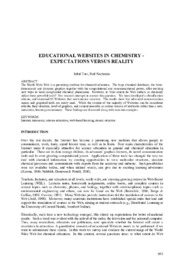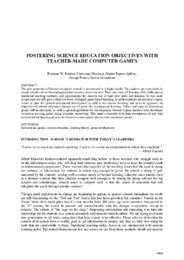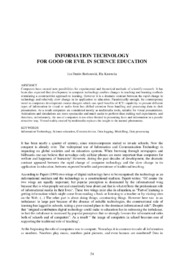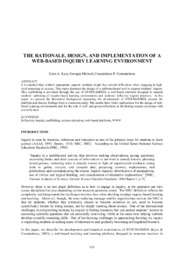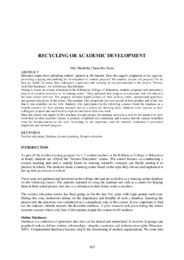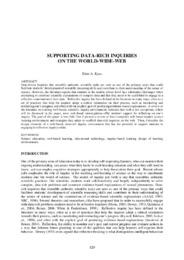Browsing Κυπριακή ερευνητική παραγωγή / Cyprus research production by Subject "Science education"
Now showing items 1-8 of 8
-
Educational websites in chemistry - expectations versus reality
(Department of Educational Sciences, University of Cyprus, 2003)The World Wide Web is a promising medium for chemical education. The huge chemical databases, the threedimensional and dynamic graphics together with the computational and communicational power, offer exciting new ways to ... -
Epistemic perspective on a conceptual evolution in physics at the secondary level
(Department of Educational Sciences, University of Cyprus, 2003)The research deals with qualitative understanding of physics notions at the secondary level. It attempts to identify and to label, in the verbalizations of 12 to 16 year-old students, the tendencies that guide their cognitive ... -
Fostering science education objectives with teacher-made computer games
(Department of Educational Sciences, University of Cyprus, 2003)The new generation of learners in today's schools is accustomed to a digital world. The students are surrounded by visual stimuli and are becoming proficient in areas not on the test! Their new ways of learning offer ... -
Information technology for good or evil in science education
(Department of Educational Sciences, University of Cyprus, 2003)Computers have created new possibilities for experimental and theoretical methods of scientific research. It has been also expected that development in computer technology enables changes in teaching and learning methods ... -
The rationale, design, and implementation of a web-based inquiry learning environment
(University of Cyprus, 2007)It is reported that, without appropriate support, students might face several difficulties when engaging in highlevel reasoning in science. This paper discusses the design of a software-based tool to support students’ ... -
Recycling or academic development
(University of Zilina, 2005)Educators argue about uploading students’ projects to the Internet. Does this support plagiarism or the opposite, preventing copying and enabling the development of student projects? Do students recycle old projects? Or ... -
Supporting data-rich inquiries on the world-wide-web
(University of Zilina, 2005)Data-driven inquiries that resemble authentic scientific tasks are seen as one of the primary ways that could facilitate students’ development of scientific reasoning skills and contribute to their understanding of the ... -
When computer use is associated with Negative science achievement
(Department of Educational Sciences, University of Cyprus, 2003)One surprising result of the Third International Mathematics and Science Study (TIMSS) is that computer use in the classroom was negatively associated with high student achievement in Cyprus, Hong Kong and the USA. The ...
